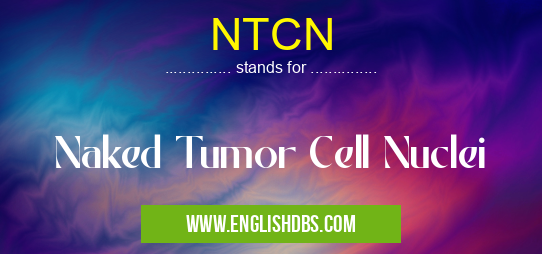What does NTCN mean in MEDICAL
NTCN stands for Naked Tumor Cell Nuclei. It is a term used in the medical field, specifically in the diagnosis and study of cancer. Naked tumor cell nuclei refer to the isolated nuclei of tumor cells that have been separated from the rest of the cell components, such as the cytoplasm and cell membrane.

NTCN meaning in Medical in Medical
NTCN mostly used in an acronym Medical in Category Medical that means Naked Tumor Cell Nuclei
Shorthand: NTCN,
Full Form: Naked Tumor Cell Nuclei
For more information of "Naked Tumor Cell Nuclei", see the section below.
NTCN: Meaning in MEDICAL
NTCNs are often used in research and clinical settings for various purposes, including:
- Cancer Diagnosis: NTCNs can be isolated from tumor samples and analyzed to determine the presence and characteristics of cancer cells.
- Cancer Grading: The morphology and other features of NTCNs can provide information about the grade and aggressiveness of a tumor.
- Prognostic Markers: NTCNs can be tested for the presence of specific molecules or genetic alterations that can indicate the prognosis and outcomes of cancer patients.
- Treatment Monitoring: NTCNs can be used to monitor the response of tumors to treatment and to detect any changes in tumor characteristics over time.
NTCN: Full Form
Naked Tumor Cell Nuclei
What does NTCN Stand for?
NTCN stands for Naked Tumor Cell Nuclei, which refers to the isolated nuclei of tumor cells used for diagnostic and research purposes in the medical field.
Essential Questions and Answers on Naked Tumor Cell Nuclei in "MEDICAL»MEDICAL"
What is NTCN?
Naked Tumor Cell Nuclei (NTCN) are fragments of tumor cells that have lost their cytoplasm and plasma membrane. They are often found in the blood or other bodily fluids of cancer patients.
Are NTCNs dangerous?
NTCNs themselves are not directly harmful. However, their presence in the bloodstream can indicate that a tumor is present and has spread. They can also be used as a marker to monitor the effectiveness of cancer treatment.
How are NTCNs used in cancer diagnosis?
NTCNs can be detected in blood samples using a variety of methods, including flow cytometry and immunocytochemistry. The presence of NTCNs in a blood sample can indicate that a tumor is present, and can help to determine the stage and type of cancer.
Can NTCNs be used to monitor cancer treatment?
Yes, NTCNs can be used to monitor the effectiveness of cancer treatment. A decrease in the number of NTCNs in the bloodstream can indicate that the treatment is working and the tumor is shrinking. Conversely, an increase in the number of NTCNs can indicate that the treatment is not effective and the tumor is growing.
What are the limitations of using NTCNs for cancer diagnosis and monitoring?
While NTCNs are a useful tool for cancer diagnosis and monitoring, they do have some limitations. For example, NTCNs can also be shed by non-cancerous cells, which can lead to false positives. Additionally, NTCNs can be difficult to detect in early stages of cancer, when the tumor is small and has not yet shed many NTCNs.
Final Words: NTCN, or Naked Tumor Cell Nuclei, is an important term in the field of cancer diagnosis and research. The isolation and analysis of NTCNs provide valuable information for understanding cancer characteristics, grading tumors, assessing prognosis, and monitoring treatment response.
